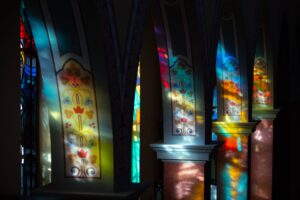
A few days ago, I read an opinion article in the Washington Post called “America Doesn’t Need More God. It Needs More Atheists.” I read it with interest, because I am always curious about what thoughtful people have to say about religion, whatever their thoughts may be. I appreciated the author’s efforts to put down in words just what she thinks and why. But in the end, I had the same reaction that I usually have to these arguments. I felt sad and frustrated.
For anyone to come to the conclusion that there is no God just feels very sad to me. Whether they reach their conclusion casually or after much serious and sincere thought, in both cases I am saddened by it. A life of faith, I believe, has so much potential to do good in the world, it feels tragic to turn away from that.
But I not only felt sad; I also felt frustrated, because I understand why someone would arrive at the conclusion that belief in God is a harmful thing. I understand why someone would come to the conclusion that the world would be better off without religion, that religion is harmful, period. I am frustrated because it is hard to argue against.
It is hard to argue against because there are many, many people who do appalling things in the name of religion.
There have been more wars than can be counted that were waged in the name of religion. The Protestant Reformation, of which the Presbyterian Church is a product, was one long, bloody, battle fought all over the European continent and Britain. You could argue that it continued to be fought up through the 20th century in Northern Ireland – the “Troubles” as they called it.
Religion stirs passion, often violent passion, and we only need to open the newspaper to see it. For all of recorded history, people have been going to war in the name of their god. And there is not one religion that has a monopoly on this kind of bad behavior. It is easy for people of any and every religion to do.
Religion often gives people a pass on judging others in the cruelest ways. Religion often leads people to assert a right to power that they probably should not have, power to hurt others. Religion often teaches the beliefs that people then use to justify harsh and oppressive rules – rules that hurt other people regardless of whether they share the same beliefs.
Religion gives people an excuse to be their worst, ugliest selves.
It’s a powerful excuse, because you can say, “It’s not me; it’s God. I personally don’t have anything against this person, religion, culture, lifestyle or decision, but God does.” When your religion leads you to believe that certain people are an “abomination” in God’s eyes. That someone’s choices or needs or circumstances are sinful. That there is one right way of living, believing, and loving, and everything else is wrong. Then it is possible to justify awful things in the name of God, and there is usually so much collateral damage when you do.
It makes me very sad and very frustrated and, in a certain way, sympathetic to the atheists who say religion ought to die a quick death. Because I too feel that the kinds of religion that promotes power to oppress and hurt and condemn other people ought to die.
If that sort of religion died, then perhaps it would be easier for people to see God. The God of the beatitudes. The God whom we see in these words of Jesus.
There are many people in our midst as well as in our memories who have carried that vision, who have glimpsed the light of God and lived their lives accordingly – with love toward their neighbors, even when they disagreed; with empathy for the needs of others and generosity to give what they could. Many of the saints who have gone before us live on in our memories and serve as an inspiration for us to do the same.
To practice humility and mercy, to mourn with those who mourn, to work for God’s righteousness and peace for all of God’s beloved world. And to know ourselves blessed.
Some years ago, I had the opportunity to hear the preacher James Forbes, the Senior Minister Emeritus of the Riverside Church in Manhattan. I was fortunate to hear him speak twice and both times he left me unraveled. Such were his gifts. On this occasion I am remembering today, after the service I approached him and for reasons I could not explain now, I began talking to him about my father-in-law. Peter Hill, Kim’s father, who was a preacher too. I told Reverend Forbes about what an extraordinary man Peter was, how his faith led him to work for righteousness, for justice, for peace, no matter what, all his life. A man who embodied the beatitudes. Reverend Forbes listened to me, like he had all the time in the world. Then he put his hands on my shoulders and said, “And now it’s all on you.”
And so it is. We remember the saints of God, with gratitude and love and admiration for the faith they lived. And now, dear ones, it’s all on you. Let us follow in the steps of the saints and know ourselves blessed.
Photo by Jacob Bentzinger on Unsplash
